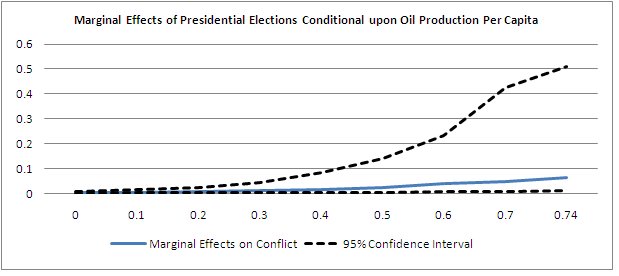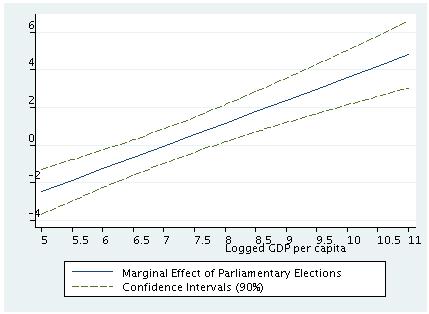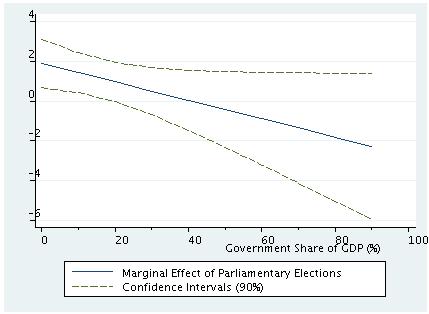- Article
- Comparative and Area Studies
Elections and Political Order: A Cross-National Analysis of Electoral Violence
August 17, 2011
Since the collapse of the Berlin Wall and the fall of the Eastern bloc, the international community has actively pushed for competitive elections in developing countries. This has led to the rapid proliferation of countries with "democratic systems" in the sense that the holders of public office are filled by means of regular public elections; indeed, by this definition, there are more democracies today than at any other time in history.
Underlying the push for elections were two optimistic beliefs: that they would reduce civil strife by providing a means for peaceful resolution of conflicts within a society, and that they would improve the quality of government by giving citizens the opportunity to replace unsatisfactory leaders. As elections have proliferated, however, these sanguine assumptions have being challenged by harsh reality.
Unintended Consequences
The spread of elections around the world has been accompanied two unintended consequences. First, elections have triggered violent clashes throughout the developing world. A case in point is Kenya, where the December 2007 presidential election was followed by ethnic violence between supporters of the incumbent and his challenger, resulting in 1,000–1,500 deaths. In Burundi, one of the world's most ethnically divided countries, a democratic presidential election was held for the first time in 1993, and it led to a bloody civil war that ultimately claimed at least 300,000 lives. In Asia as well, post-election violence has frequently disrupted the political order in India and Sri Lanka.
Another unanticipated development is the frequent failure of periodic elections to strengthen political accountability and replace bad leaders with better ones. In fact, there is even evidence that they have served to keep autocratic rulers in power. [1] This tendency has been conspicuous in Russia, Kazakhstan, Belarus, and other former Soviet republics. In Asia, Malaysia and Singapore provide examples of countries in which elections, instead of acting as a sanctioning mechanism, have merely legitimized the existing power structure.
In many cases, then, the very elections that promised to resolve internal conflicts and promote periodic change at the top have had the paradoxical effect of precipitating violence or enabling a small oligarchy to remain in power almost indefinitely. In an attempt to explain this paradox, the authors newly constructed a monthly data set on elections and violent conflicts between 1960 and 2000 in approximately 150 countries around the world and have used that data to examine hypotheses derived from theoretical expectations.
Dangers of High-Stakes Elections
On the face of it, it might seem contradictory that elections can cause violent clashes on the one hand yet strengthen authoritarian regimes on the other. However, the authors theorized that these seemingly irreconcilable phenomena are two sides of the same coin, illustrating the difficulties facing developing countries that choose their political leaders through elections.
Competitive elections are held to determine who will make up a country's government. Those who control the government have the ability to influence the distribution of society's wealth in a variety of means. Voters tend to cast their ballots for the candidates that will deliver them the greatest benefits. All of this is a matter of course. From here, however, it can be surmised that the more drastically an election affects the distribution of wealth in the society, the higher the stakes become, and the more likely it becomes that the election will trigger violence.
The reason is that the losers in a competitive election have only two choices: to accept the outcome and wait for the next election, or to try to overturn the results through violence. Naturally, the losers of an election are more likely to be motivated to overturn the results by violence if those results threaten their vital interests. We hypothesized that this was the mechanism underlying post-election violence.

Our analysis found statistical evidence supporting this hypothesis. [2] The two keys factors were (1) the type of election (presidential versus parliamentary/legislative) and (2) the degree of dependence on petroleum resources. Presidential elections, which directly elect a single person to fill the top executive office in the country, have higher stakes than elections for national assemblies and would thus be more likely to precipitate violence. In oil-producing countries, the oil revenues would further raise the stakes of such presidential elections, since the oil industry is generally state-run (owing to the need for massive investment in fixed assets) and its profits are thus a national resource. Our empirical analysis corroborated these predictions: The incidence of armed conflicts yielding 25 or more fatalities was 0.2 points higher within six months of a presidential election than at other times, a statistically significant increase. When presidential elections were held in oil-producing countries, the incidence rose from 1% to 7%.
This analysis provides a lucid explanation of the violence that occurred in Nigeria in April this year. Although elections for the national assembly were held without major incident, the presidential election a week later triggered violence on a large scale. A presidential election in a country like Nigeria, with its vast oil riches, is precisely the type of high-stakes scenario most likely to lead to a breakdown in political order.
Stability at the Cost of Democracy
If post-election violence is most likely to occur in the wake of elections that can drastically affect the distribution of wealth, one might imagine the problem could be solved by limiting the competition in an election and protecting the losers' vital economic interests. In fact, this "solution" is the mechanism by which autocratic leaders are nurtured and sustained by elections. Recent research suggests that elections in countries with authoritarian regimes actually function to maintain a stable and effective distribution of economic benefits among the society's various interest groups and sectors (including the ordinary citizenry and the elite). By manipulating the electoral system and the rules governing voting, rulers attempt to maintain a stable distribution of wealth among various sectors of society. This helps maintain political stability, but it also keeps the same autocratic regime in power, election after election.
We analyzed the data to better understand this relationship between elections and autocratic regimes. [3] The key factors were (1) the relative value or impact of distribution and (2) the scale of government. With regard to (1), the government's distribution of wealth and resources can be expected to have a disproportionately large impact in countries with a low per-capita gross domestic product. For low-income households survival can depend on welfare benefits or jobs secured through the state. At the same time, in developing countries, where the economy and the state tend to be closely intertwined, a high-level administrative or political position in government can provide a relatively easy path to economic prosperity. With regard to (2), in countries with large public sectors, autocratic rulers can distribute wealth more widely through patronage. Widespread distribution of wealth makes it difficult for opposition forces to gain traction against autocrats, and as a result, elections tend to become occasions to legitimize and reinforce the existing power structure.

Our empirical analysis supported these suppositions. The data indicates that in countries with a per-capita GDP of about $3,000 or less, elections either have no positive effect on the outbreak of domestic conflicts or even have the effect of stabilizing authoritarian regimes. In countries with a per-capita GDP in excess of about $3,000, by contrast, elections under authoritarian regimes tend to lose their regime-

stabilizing effect. We also found that when government spending is in excess of 20% of GDP, there is no statistically significant correlation between elections and the outbreak of armed conflicts under autocratic regimes, but when the government is smaller, elections under autocratic regimes are more apt to threaten political order.
The results of our research suggest that developing countries must walk a fine line in order to achieve stable democratic government. If elections threaten vital interests, the losers may resort to violence to overturn the results. But when governments focus on ensuring the stable distribution of wealth, elections are apt to degenerate into a means of legitimizing and prolonging autocratic government. In impoverished countries, it is no easy matter to avoid both of these traps.
Today, almost two decades after the end of the Cold War, we are coming to see that the road to democracy is more difficult than we supposed. Elections are a basic prerequisite for democracy, but they are not sufficient. To promote democracy throughout the world, the international community must do more than hold and monitor elections. It must also provide ongoing support to ensure that the losers are not dispossessed and that government power is subject to a well-established system of checks and balances.
[1] Gandhi, Jennifer and Adam Przeworski, "Authoritarian Institutions and the Survival of Autocrats," Comparative Political Studies 40-11 (2007): 1279-1301.
[2] Masaaki Higashijima and Shin Toyoda, “Electoral Violence in Democracies, 1960-2000,” paper presented at the Southern Political Science Association, New Orleans, 2011.
[3] Masaaki Higashijima and Shin Toyoda, “Elections and Political Order under Autocracy,” paper presented at the Southern Political Science Association, New Orleans, 2011.
